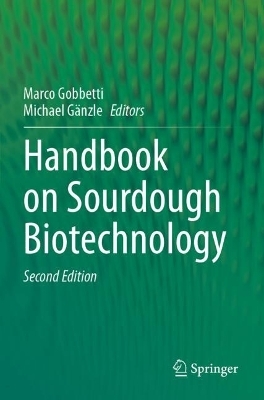
Handbook on Sourdough Biotechnology
Springer International Publishing (Verlag)
978-3-031-23086-8 (ISBN)
Bread and leavened bakery products have been essential to human nourishment for millennia. Traditionally, bread production has relied on the use of sourdough as a leavening agent and to impart a characteristic quality to baked goods. In recent years, improved understanding of the biodiversity and microbial ecology of sourdough microbiota, the discovery of new species, the improved management and monitoring of its meta-community and the commercialization of innovative products have vastly expanded the potential of sourdough fermentation for making baked goods. For example, raw materials such as cereals, pseudo-cereals, ancient grains, and gluten-free substrates, as well as a large number of baked good varieties (e.g., typical and industrial breads, sweet baked goods, gluten-free products) may benefit from advances in sourdough fermentation. In addition, biotechnological tools and culture properties have been discovered to improve both the shelf life and the sensory and textural qualities of baked goods, as well as their nutritional and health-promoting properties.
Now in its second edition, the Handbook on Sourdough Biotechnology remains the only book dedicated completely to sourdough biotechnology with the contribution of the most experienced researchers from the field. It reviews the history of sourdough and the potential of sourdough fermentation in the production of bread and baked goods. A thorough discussion of the various processing steps includes the chemical properties of the raw matter, the taxonomy, diversity, and metabolic properties of starter yeasts and lactic acid bacteria, and the effects of sourdough fermentation on the shelf life and the sensory, textural, nutritional, and health-promoting properties of baked goods.
Marco Gobbetti is full professor of Food Microbiology at the Faculty of Science and Technology of the University of Bolzano. He is author of more than 400 articles, all published in international journals. His H index is 90, with more than 25,000 citations. Sourdough microbiology is one of the main topics of his research. Michael Gänzle is full professor and Canada Research Chair in Food Microbiology and Probiotics at the Department of Agricultural, Food and Nutritional Science of the University of Alberta. The microbial ecology of cereal fermentations and the influence of fermentation on bread quality are a major focus of his research program.
1. History and Social Aspects of Sourdough.- 2. The sourdough legislation.- 3. Chemistry of Cereal Grains.- 4. Technology of Sourdough Fermentation and Sourdough Applications.- 5. Steamed Bread.- 6. Taxonomy and Biodiversity of Sourdough Lactic Acid Bacteria.- 7. Taxonomy, Biodiversity and Physiology of Sourdough Yeasts.- 8. Physiology and Biochemistry of Lactic Acid Bacteria.- 9. Sourdough: A Tool to Improve Bread Flavor, Rheology and Shelf Life.- 10. Sourdough: A Tool for Non-Conventional Fermentation and To Recover Side Streams.- 11. Nutritional Aspects of Cereal Fermentation with Lactic Acid Bacteria and Yeasts.- 12. Sourdough and Gluten-Free Products.- 13. Sourdough and Cereal Beverages.- 14. Perspectives.
| Erscheinungsdatum | 27.04.2024 |
|---|---|
| Zusatzinfo | VI, 397 p. 47 illus., 26 illus. in color. |
| Verlagsort | Cham |
| Sprache | englisch |
| Maße | 155 x 235 mm |
| Themenwelt | Naturwissenschaften ► Biologie ► Mikrobiologie / Immunologie |
| Schlagworte | Biotechnology • Breadmaking • Fermentation • lactic acid bacteria • sourdough |
| ISBN-10 | 3-031-23086-8 / 3031230868 |
| ISBN-13 | 978-3-031-23086-8 / 9783031230868 |
| Zustand | Neuware |
| Informationen gemäß Produktsicherheitsverordnung (GPSR) | |
| Haben Sie eine Frage zum Produkt? |
aus dem Bereich


